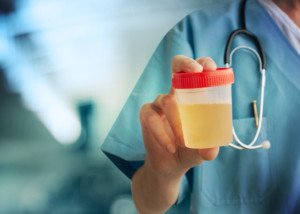
Did your Pap smear make your bladder feel full enough to burst, like you had to pee a whole gallon?
So after the doctor is finished with the Pap smear, having removed the speculum and completed the digital exam, you’re left lying immobile because it feels that your bladder is suddenly filled to the hilt with urine.
But you know there can’t be any urine in there because:
• You relieved yourself right before the exam.
• You didn’t even have a drop of water prior to the exam.
• The preceding day you went light on the water.
You induced dehydration to lessen any bladder discomfort from a Pap smear, but this time, the urge to pee was overwhelming. What could cause this?
“The only comment I would have on this question is that (depending on the examiner and the patient) a pelvic examination (speculum placement, bimanual examination) can possibly irritate the vaginal tissues and may cause a patient to have transient overactive bladder symptoms,” says R. Mark Ellerkmann, MD, Director, The Urogynecology Center at Mercy Medical Center, Baltimore.
The severe urge to pee after a Pap smear has nothing to do with the actual buildup of urine in the bladder.
#1 Urine comes from the kidneys.
#2 A Pap smear cannot magically make urine fill up the bladder.
#3 It’s only an illusion.
The vagina is also very close to the urethra, so any handling of the vagina could irritate the urethra, simulating an urge to void.
And all of this is what you must remind yourself for your next Pap smear, especially when it’s completed and you’re lying there very still, feeling as though at any moment you’re going to leak.
Give this sensation five or so minutes to pass. Just lie there and breathe deeply, eyes closed. Tell your doctor why you want to just lie there, then do it.
Dr. Ellerkmann adds, “It is highly unlikely that a pelvic examination increases the risk of a urinary tract infection — often responsible for transient OAB symptoms — or any trauma to the pelvic floor.
“It is just that pressing and palpating (feeling) the bladder and uterus can cause a sensation of ‘needing’ to go.”
Dr. Ellerkmann is board certified in both OB/GYN and female pelvic medicine and reconstructive surgery. He specializes in the treatment of urinary incontinence in women of all ages.
is board certified in both OB/GYN and female pelvic medicine and reconstructive surgery. He specializes in the treatment of urinary incontinence in women of all ages.
 Lorra Garrick has been covering medical, fitness and cybersecurity topics for many years, having written thousands of articles for print magazines and websites, including as a ghostwriter. She’s also a former ACE-certified personal trainer.
Lorra Garrick has been covering medical, fitness and cybersecurity topics for many years, having written thousands of articles for print magazines and websites, including as a ghostwriter. She’s also a former ACE-certified personal trainer.
.









































